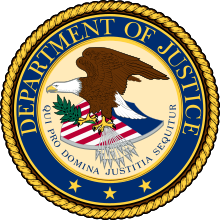United States Attorney
A United States Attorney (including US Attorney , dt. About attorney of the United States ) represents the United States in criminal and civil proceedings before the Bundesbezirks- and the federal courts of appeal . There are a total of 93 US Attorneys in the United States, Puerto Rico, the US Virgin Islands, Guam, and the Northern Mariana Islands. Any judicial districtwith the exception of Guam and the Northern Mariana Islands, there is exactly one US Attorney assigned. He assumes the role of the highest criminal prosecutor for federal crimes within his district and oversees up to 350 assigned public prosecutors. The US Attorneys are organizationally part of the United States Department of Justice and are therefore subordinate to the United States Attorney General . In addition, in the US criminal system there is also the district attorney who is responsible for prosecuting state crimes in his respective district.
history
The US Attorneys were created as an agency along with the Office of Attorney General by the Justice Act 1789 . The same statute established the constitution of the United States Supreme Court and lower federal district courts . Accordingly, a person with legal training should be appointed for each judicial district to be responsible for both law enforcement and for representing the United States as a plaintiff or defendant in civil matters. The US attorneys were independent until 1870 and were not subordinated to the Attorney General until the Justice Department was established.
appointment
The US attorneys are appointed by the President of the United States with the approval of the Senate for a four-year term. At the end of his term of office, he remains in office until a successor is appointed, but can also be removed from office by the President at any time. In the event that the position of a US Attorney is vacant, the Attorney General may temporarily fill the position, but not for longer than 120 days. Thereafter, a provisional representative is to be appointed by the District Court. Due to the USA PATRIOT Act as amended in 2006, the US President was able to appoint an interim representative for an indefinite period without hearing the Congress. On June 4, 2007, however, Congress submitted the United States Code, to preserve the independence of United States attorneys, to the US President for signature. Bush signed the law on June 14, 2007. This put the old regulation back into effect.
Individual evidence
- ^ United States Attorney Office for the District of Columbia .
- ^ Federal Judiciary Act (1789). National Archives and Records Administration , accessed December 8, 2014 .
- ^ Gregory C. Sisk, 2nd Edition Editors: John Steadman, David Schwartz &, Sidney B. Jacoby .: Litigation With the Federal Government (2nd Edition) . ALI-ABA (American Law Institute - American Bar Association), 2006, ISBN 0831808659 , pp. 12-14. partly available online
- ↑ 28 United States Code § 541
- ↑ United States Code § 546. Legal Information Institute, accessed December 8, 2014 .
- ↑ Torsten Krauel: Public prosecutors are not dismissed. Die Welt , March 14, 2007, accessed December 7, 2014 .
- ^ Office of the Press Secretary: President Bush Signs, p. 214. The White House, June 14, 2007, accessed December 7, 2014 .
